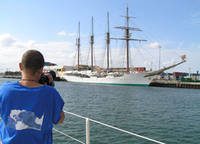April 20, 2005
Leaving Harbour Towne Marina ( Fort Lauderdale ). Wednesday, April 20 2005
Yesterday a new sailor, José Carlos Corral, came aboard. He is also a diver, has been since he was 15. “You must have 3,000 dives logged,” Mar says to him. “Well, the truth is I haven’t counted…” José Carlos has been working as a dive master in Zanzibar for the past three months. For non-diving-experts, the title of dive master allows him to serve as a guide for groups of divers. Our new Expedition colleague is also a guitarist. “I was trained in classical but I play jazz.” If the trend continues we’ll be able to start the “Ranger band”.

We get moving. It’s 8:20 in the morning and the catamaran advances a few meters to the re-fueling area. Part of the crew is inside collecting provisions, including water reserves. It seems impossible that everything could fit in such a limited space, but eventually Indi, Mar, Sole and Ricardo take it upon themselves to clean up the messroom (literally a mess of a room, a multi-purpose space that, depending on the time of day, serves as a reading and recreation room, kitchen, dining room, and work area in general). Right now it is only expected to be in order for departure.
Finally, today, 20 days after its arrival in Florida, at 11:30 in the morning the Oceana Ranger abandons Harbour Towne Marina for Miami, where our colleagues from Oceana USA have organized a press conference to send off the Expedition from North American waters. Already Sonia Osorio, a journalist with the Spanish press agency EFE in Miami, has called us and has interviewed Ricardo Aguilar.
“We have five hours of sailing ahead,” the captain informs us. Our destination is Bayside Marina, a water sport port in downtown Miami.
Without further ado we leave, sailing through mangroves. Two ibises are settled majestically in the crown of a red mangrove (Rhizophora mangle). We also see an osprey (Pandion haliaetus), a heron and many Florida brown pelicans (Pelecanus occidentalis), identifiable by their yellow head.
We sail at approximately three knots, but entering the open ocean we speed up to seven. We travel parallel to the coast, at a distance of three miles. A continuous line of immense skyscrapers accompanies us throughout the trip. Five and a half hours later, a group of dolphins come to welcome us, swimming at the Ranger’s prow. It is the sign that we have arrived in Miami. And what a coincidence! As we enter the port, there appears ahead of us, majestic, the Spanish Navy training ship Juan Sebastián Elcano, which is also moored here. We leave it behind while a poster directs us to lessen our speed, since this is a manatee zone.


